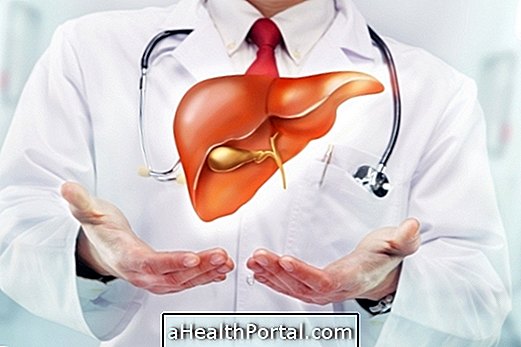Fulminant hepatitis, also known as severe acute hepatitis or hyperacute liver failure, is one of the most serious inflammation of the liver and has a high incidence of death.
This disease is characterized by its rapidity, where an apparently healthy individual can become deeply sick within a few days, developing the characteristic symptoms of hepatitis, necessitating hospitalization.
The causes of fulminant hepatitis may be autoimmune diseases, hepatitis A or B, and the use of medications such as antibiotics, psychotropics, antidepressants, diabetes remedies, painkillers such as Paracetamol and teas used for weight loss. As this disease is not caused by viruses or bacteria, fulminant hepatitis is not contagious.
Symptoms of Fulminant Hepatitis
The symptoms of fulminant hepatitis may manifest rapidly, and within a few hours the person may appear to be very weak. Symptoms of fulminant hepatitis may include:
- Dark urine;
- Yellowish eyes and skin (jaundice);
- General malaise
- Low fever;
- Nausea;
- Pain in the right side of the abdomen;
- Abdominal swelling;
- Sleep disturbances.


When the person is very compromised the reasoning can be slow, being indicative of advanced state of the disease. For the diagnosis of fulminant hepatitis the doctor should observe the patient and request laboratory tests and biopsy of the hepatic tissue that allows to detect the severity of the lesions and sometimes the causes of the disease.
Causes of fulminant hepatitis
Some causes of fulminant hepatitis may be:
- Complication of hepatitis A and B;
- Autoimmune diseases such as Reye's Syndrome and Wilson's Disease;
- Use of medications such as antibiotics, psychotropic drugs, antidepressants, diabetes medicine and analgesics;
- Slimming teas;
- Lack of oxygen in liver tissues;
- High fever;
- Excess fat in the liver during pregnancy.
When any of these situations are present the person's liver can be severely affected, failing to be able to filter the blood to eliminate its impurities and to store vitamins and minerals. As liver function is essential to life, when the organ reaches this point the person has symptoms such as yellowing of the skin and eyes, loss of appetite, nausea, dark urine, weight loss, and abdominal bloating. When treatment is not started promptly, the liver stops converting the ammonia into urea and the disease progresses affecting the brain, giving rise to a condition called hepatic encephalopathy, which can be followed by failure or failure of other organs such as kidneys or lungs, and possible coma.
Treatment for Fulminant Hepatitis
The treatment for fulminant hepatitis is done in a hospital setting and consists of taking medications to detoxify the liver. It is important that the individual is fasted for a period and then receives an adequate, fat-free diet. Sometimes dialysis to purify the blood is needed. Here's how it's done: Hemodialysis.
However, this is not always enough to cure fulminant hepatitis, because liver transplantation is sometimes necessary. When the doctor indicates this need, the patient remains in the ICU, waiting for the transplant, until a compatible donor appears. The waiting time in the queue for transplantation depends basically on the availability of a compatible organ, but patients with fulminant hepatitis are recognized as a top priority, and pass the rest of the patients with the first compatible liver available for transplantation. Learn more at: Liver Transplant.
Fulminant hepatitis has a cure?
Fulminant hepatitis is curable when treatment is assertive and is established rapidly. Not always the drug treatment is sufficient to recover the functions of the liver, in which case the liver transplant is indicated.
Patients with fulminant hepatitis are recognized as top priority, and pass the others with the first available compatible liver that emerges for transplantation. Understand how the procedure is done in: Liver transplantation.
After transplantation, the individual may present a survival that varies according to the cause of liver failure, among other aspects such as age and involvement of other organs such as the kidneys, for example.
























